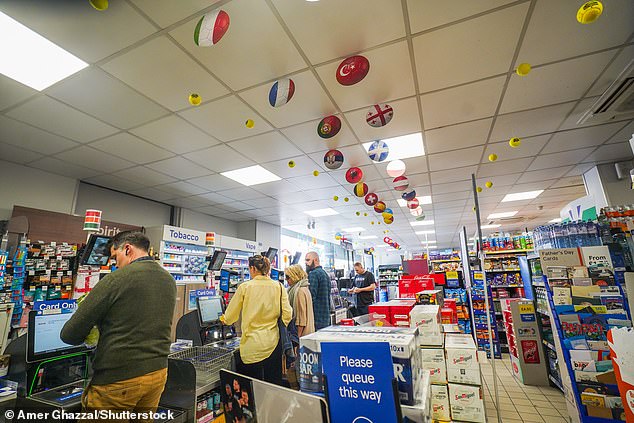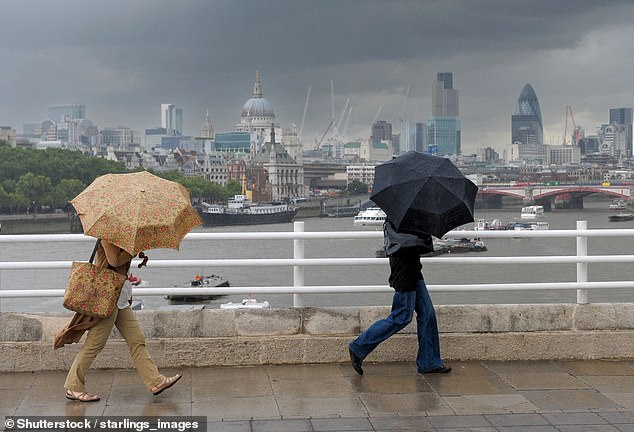Table of Contents
Consumer confidence took a hit in September as households worried about possible tax rises in the upcoming Budget, a closely watched index showed.
Market research firm GfK’s consumer confidence index for September fell to -20, the lowest level seen since January.
The last time the index fell so sharply was in April 2022, in the wake of Russia’s invasion of Ukraine, which sent energy costs soaring.
GfK said the data did not provide “encouraging news” for the new Labour government.
On the decline: GfK’s consumer confidence index for September fell to -20
Neil Bellamy, director of consumer insights at GfK, said: “Overall consumer confidence has brought us back to a similar level to that seen earlier this year.”
He added: “Despite stable inflation and the prospect of further cuts in the base rate, this is not encouraging news for the new UK government.”
Looking ahead to the Autumn Budget, Bellamy said: “Strong consumer confidence is important because it underpins economic growth and is an important driver of shoppers’ willingness to spend.
‘Following the withdrawal of the Winter Fuel Payment and clear warnings of tough decisions on tax, spending and welfare, consumers are nervously awaiting the budget decisions on 30 October.’
Britons have been warned to expect a “painful” budget on October 30, with rumours of a raft of tax rises on the cards.
Bank of England Governor Andrew Bailey said on Thursday he thought underlying confidence was rising but that consumers “want to see evidence that this is sustained.”
Retail sales rise in August
Despite lower consumer confidence, retailers saw sales rise last month as summer discounts and warmer weather helped boost clothing stores and supermarkets, according to official estimates.
Food sales gave retailers a significant boost in August, with annual sales rising to the highest level since summer 2021, the Office for National Statistics said.
The total volume of retail sales, which measures the amount purchased, rose by 1 percent in August, according to the ONS. Most analysts expect a rise of around 0.4 percent.

Boost: Retailers saw sales rise last month, ONS data shows
The figure follows a 0.7 percent rise in volumes in July, which was revised up from a previous estimate of a 0.5 percent increase, as discounts and sporting events including the European Championship boosted sales.
Sales volumes rose 1.2 percent in the three months to August, compared with the three months to May.
Grant Fitzner, chief economist at the ONS, said: “Retail sales rose in August as warmer weather and end-of-season promotions helped boost sales, particularly in clothing and food stores.”
He added: ‘Supermarkets in particular contributed to the largest annual increase in food sales since the summer of 2021.
‘Overall retail sales also increased in the quarter and the annual period, following strong growth in online retailers. However, overall sales remain slightly below their pre-pandemic level.’
Kris Hamer, chief information officer at the British Retail Consortium, said: ‘With summer in full swing, sales growth accelerated in August.
‘IT performed well as deep summer discounts encouraged consumers to upgrade their technology and students got organized for the new academic year.
‘Food, cosmetics and fashion sales also had a good month as people hosted family and friends for picnics and barbecues and prepared for summer vacations and other social events.
‘Meanwhile, furniture and home goods failed to shine as people opted to spend their money on experiences.
‘It’s clear that the high cost of living is still weighing on consumers, meaning demand could fall further when energy bills rise again in October.’
David Belle, founder and trader at Fink Money, told Newspage: ‘The retail sector came alive in August. Although the economy is stagnant, there is money available somewhere. I don’t usually give the Bank of England credit, but it has played well by keeping rates unchanged.
Next said on Thursday it had posted better-than-expected sales in the first six weeks of its second half, reflecting improved sentiment.
However, Primark reported a fall in underlying UK sales in its latest quarter and on Tuesday B&Q and Screwfix owner Kingfisher said demand for kitchens and bathrooms was weak.
DIY INVESTMENT PLATFORMS

AJ Bell

AJ Bell
Easy investment and ready-to-use portfolios

Hargreaves Lansdown

Hargreaves Lansdown
Free investment ideas and fund trading

interactive investor

interactive investor
Flat rate investing from £4.99 per month

Saxo

Saxo
Get £200 back in trading commissions

Trade 212

Trade 212
Free treatment and no commissions per account
Affiliate links: If you purchase a product This is Money may earn a commission. These offers are chosen by our editorial team as we believe they are worth highlighting. This does not affect our editorial independence.
Some links in this article may be affiliate links. If you click on them we may earn a small commission. This helps us fund This Is Money and keep it free to use. We do not write articles to promote products. We do not allow any commercial relationships to affect our editorial independence.



